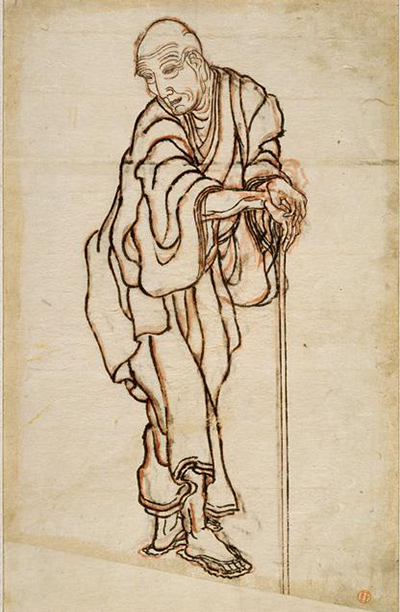Hokusai
Self Portrait in the Age of an Old Man by Hokusai
Hokusai was a Japanese master artist as well as a printmaker of the Ukiyo-e School. His work has a reflection of a full spectrum of Ukiyo-e art which includes a variety of hand painting, single sheet prints of actors and landscape.
One of his famous print series known as the Thirty-six Views of Mount Fuji which he published between the years 1826 to 1833 manifested a history in Japanese landscape print. Among his famous and particular artwork includes:
The Great Wave of Kanagawa
This was part of the series that he produced in between the year 1830 to 1833. It is a multicoloured (polychrome) woodblock print made of ink and colour. The catching feature of the painting is the extension of the wave which seems like it is about to break with its claw-like crest. It too depicts photos of three boats that are being threatened by this enormous wave while Mt. Fuji rises in the background.
The picture gives an impression of man’s glory and his ingenuity, his bravery as well as fearlessness. As the three rowing boats are trying to fight to survive the wrath from this great wave, it symbolises man’s strength and his determination when overcome by struggles and the adversities of nature. The technique used was the use of a block carver where the thin washi paper is glued to a block of wood typically a cherry, then carefully carved away forming a relief of the image lines.
Dragon Of Smoke Escaping From Mt Fuji
This series on Dragon of smoke escaping from the Mt Fuji is one of the excellent examples of Hokusai’s Ukiyo-e which is one of the artist favourite obsessions. In his work on this Hokusai depicts the front and centre of the mountain, with a certainly thick black smoke where a dragon is seen circling above. The mountain is further portrayed looking angelic, pristine white and untouched.
For the fact that Hokusai is well known to evoke particular reverence of Mountain Fuji and other landscape techniques, this piece celebrates that too. In the dragon circling up, Hokusai saw himself going to heaven. The meaning of this symbolises the structure of human being and their process of life. It showed that beauty does exist when through its suggestiveness, only a few words can describe what has not been demonstrated or even said which later awakens many inner thoughts and feelings.
